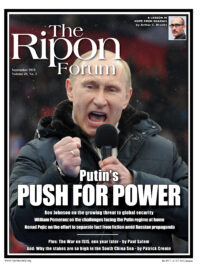 It will be one year this September since the U.S. president declared the formation of an international coalition to ‘degrade and destroy’ ISIS. After 6,000 air strikes, 9,000 targets struck, 10,000 fighters killed, and various battles undertaken in Iraq and Syria, the war is at a strategic stalemate.
It will be one year this September since the U.S. president declared the formation of an international coalition to ‘degrade and destroy’ ISIS. After 6,000 air strikes, 9,000 targets struck, 10,000 fighters killed, and various battles undertaken in Iraq and Syria, the war is at a strategic stalemate.
ISIS’s spread has indeed been slowed and it is on the defensive in some areas, but it has made advances elsewhere and its control of its main cities remains strong. It is under no imminent threat of defeat. In addition, it has won declarations of allegiance from militant groups in Libya, Egypt, Tunisia, Algeria, Nigeria, Yemen, and Russia, and it has eclipsed Al Qaeda as the global radical brand of choice. It poses a grave danger to the already faltering state order in the Middle East and a direct national security terrorist threat to the US and other societies around the world.
The current U.S.-led strategy might succeed in ‘containing’ ISIS within its core holdings in Syria and Iraq, but not in destroying it. However, the threat that ISIS poses is not conventional, and the power of its example and terrorist appeal will only be reinforced as its ‘Caliphate’ survives and thrives in the heart of the Levant. Unless current strategies are dramatically revised, the ISIS terrorist state will become a fixed feature of the fractured Middle East, and a major factor in regional and international security for many years to come.
It is difficult in such a short essay to fill out a detailed vision, but any strategy to “degrade and ultimately destroy ISIS” must be revised and strengthened in the following areas:
The Primacy of Politics. War is the continuation of politics by other means. Although there is a core of zealots at the heart of ISIS, the conditions that enabled ISIS to grow and conquer in both Syria and Iraq have to do with the political conditions in those two countries. And the conditions for drying up support for them, and encouraging Arab Sunni groups to take them on, have to do with the transformation of those political conditions.
Unless current strategies are dramatically revised, the ISIS terrorist state will become a fixed feature of the fractured Middle East, and a major factor in regional and international security for many years to come.
In Iraq, President Obama was right to insist that the divisive prime minister Nouri al Maliki had to leave and a more inclusive government be put in place. But reconciliation and power sharing in Baghdad has stalled. Unless Iraqi Arab Sunnis feel that they have a real and permanent share of power in the Baghdad government, ISIS — or other radical Sunni groups –will continue to exploit their grievances.
In Syria, the problem is more acute. President Assad has refused any political compromise and, through immense brutality, has driven his Sunni-majority population toward open jihad. ISIS owes much of its rise — and long term survival — to Assad. Unless he leaves power and a new transitional power sharing government — with elements of the regime and the non-radical opposition — is put in place in Damascus, it will be impossible to turn the Sunni tide in Syria.
Indeed, the departure of Assad is a linchpin for winning over Sunni support, and a key turning point in the war against ISIS. For even if ISIS is pushed out of most of Iraq, unless it is defeated in Syria its threat will not be significantly diminished.
The U.S. needs to realize that the departure of Assad — preferably through a negotiated solution — is a strategic priority in the fight against ISIS. With Assad gone and an inclusive transitional government in power in Damascus, rebel groups currently fighting Assad could turn all their energies against ISIS, and the Syrian armed forces — currently being used by Assad against his own people — could also be fully directed against ISIS. The successful nuclear diplomacy with Iran opens the door for reviving serious international and regional diplomacy over political transition in Syria.
Stronger Military Action. The strategy and tactics used so far have served to contain ISIS in Iraq and Syria. But they have arrived at a standoff, not a path to victory. In Iraq, what is required is redoubled efforts to stand up more units of the Iraqi national army, and rapid progress toward standing up an indigenous and capable National Guard and police force in the vulnerable Sunni majority provinces of Iraq.
In Syria, it means working with allies to enable more training and support for the non-ISIS and non-Jubhat al Nusra opposition that has already been making progress in southern and northern Syria. If Assad leaves power and an inclusive government is put in place in Damascus, then the U.S. can also work with the new authorities to bring the Syrian armed forces fully into the coordinated fight against ISIS.
The U.S. needs to realize that the departure of Assad — preferably through a negotiated solution — is a strategic priority in the fight against ISIS.
The war against ISIS will also require that the U.S., as the leader of the anti-ISIS coalition, increase its military presence on the ground in both Iraq and Syria. The increase will not be for combat roles, but for important reconnaissance, information gathering, coordination, training and support roles. The efforts will also require more on-the-ground commitment from regional allies, possibly in parts of Syria.
Rebuilding the Regional State Order. ISIS was not around four years ago. The conditions that enabled it were brought about by the eruption of demands for political and economic inclusion that were expressed in the Arab uprisings. These uprisings caused the collapse of several sclerotic Arab states. The conditions that ISIS exploited also relate to the proxy conflict between Shiite Iran and the Sunni states of the Gulf and Turkey.
There are currently four open and proxy civil wars in the Arab world. The U.S. and other key players in the international and regional community should focus on bringing these civil wars to a negotiated end, de-escalating Iranian-Arab tensions, and helping post-conflict states rebuild national institutions and authority. This is as difficult and complicated to achieve, as it is necessary. But unless some semblance of regional and state order is restored in the Middle East, the war against ISIS today, or another variation of it tomorrow, will see no end.
Paul Salem is the Vice President for Policy and Research at the Middle East Institute in Washington DC.




